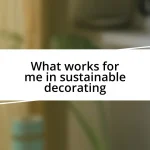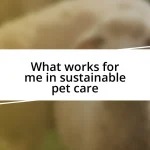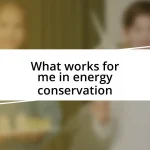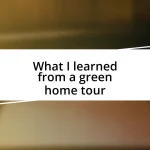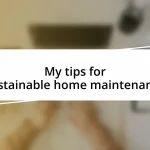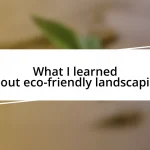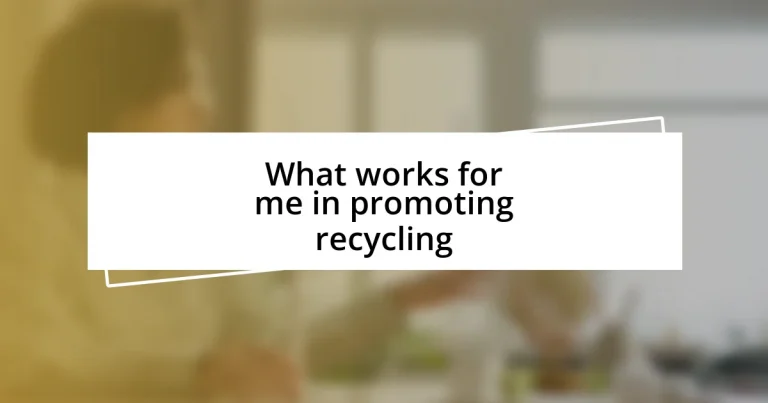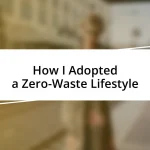Key takeaways:
- Recycling significantly reduces waste and conserves resources while also providing economic benefits by creating jobs and saving energy.
- Community engagement strategies, such as organizing clean-up events and leveraging social media, can enhance recycling efforts and foster collective responsibility.
- Collaborating with local organizations and businesses amplifies recycling initiatives, creates educational opportunities, and empowers the next generation through programs like “Recycling Ambassador.”
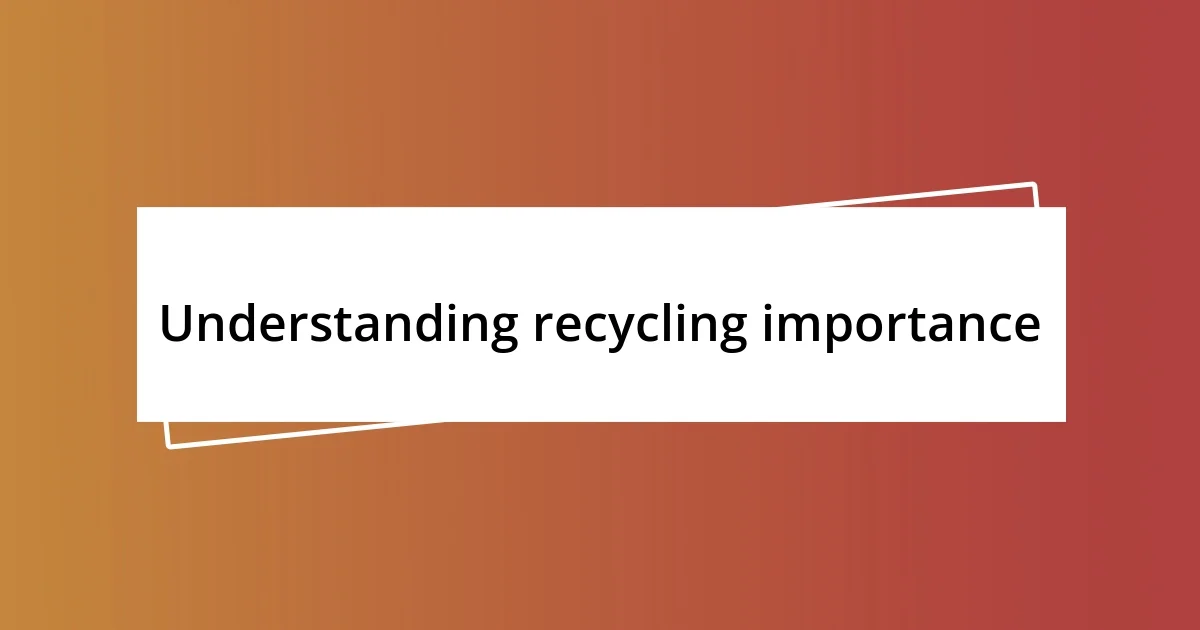
Understanding recycling importance
Recycling is more than just a trend; it’s a vital practice that can significantly reduce waste and conserve natural resources. I remember the first time I learned how recycling could decrease pollution; it truly struck a chord with me. Seeing how much less waste went to the landfill after I started sorting my recyclables was a small yet powerful change in my daily routine.
The emotional weight of knowing that each bottle or paper I recycle contributes to a healthier planet is both inspiring and motivating. Have you ever thought about how much waste your household generates in a week? For me, tracking that made me realize that each small action adds up, creating a substantial impact on our environment over time.
Understanding the importance of recycling also means appreciating the economic benefits it brings. I recall visiting a local recycling facility and witnessing firsthand how materials were transformed into new products. This not only creates jobs but also saves energy and resources, making it a win-win situation. Isn’t it remarkable to consider that something as simple as separating our waste can ripple through the economy and the ecosystem?
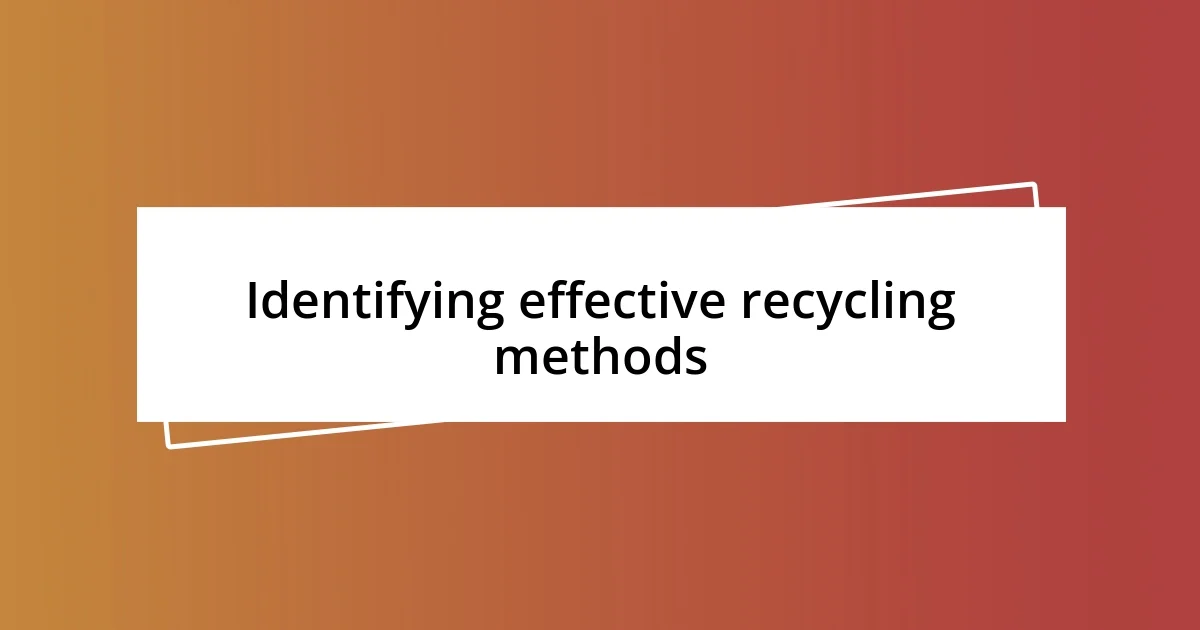
Identifying effective recycling methods
Identifying effective recycling methods involves recognizing which practices truly make a difference. For instance, I’ve found that education plays a huge role in promoting good recycling habits. A few years back, I attended a community workshop that broke down the dos and don’ts of recycling. It was eye-opening to learn how contamination can ruin entire batches of recyclables. This session inspired me to create simple flyers that I distribute to neighbors, explaining how to sort their waste effectively.
Another crucial method I’ve encountered is providing accessible recycling bins in homes and public spaces. I remember one summer when my city installed new recycling stations at parks — it immediately encouraged healthier recycling behaviors among residents. These bins were clearly labeled and easy to use, making it convenient for people to participate. It reassured me that when recycling is made simple, communities respond positively.
Lastly, engaging with technology can enhance recycling efforts. There’s an app I started using that helps track my recycling habits and reminds me of local recycling events. The gamification aspect keeps it fun and rewarding. If you’d asked me how effective technology could be a year ago, I would’ve been skeptical, but now I see just how powerful it is in motivating individuals like me to keep recycling top of mind.
| Method | Description |
|---|---|
| Education | Workshops and resources to clarify recycling guidelines. |
| Accessibility | Conveniently placed recycling bins in public and residential areas. |
| Technology | Apps that track and remind users about recycling habits. |
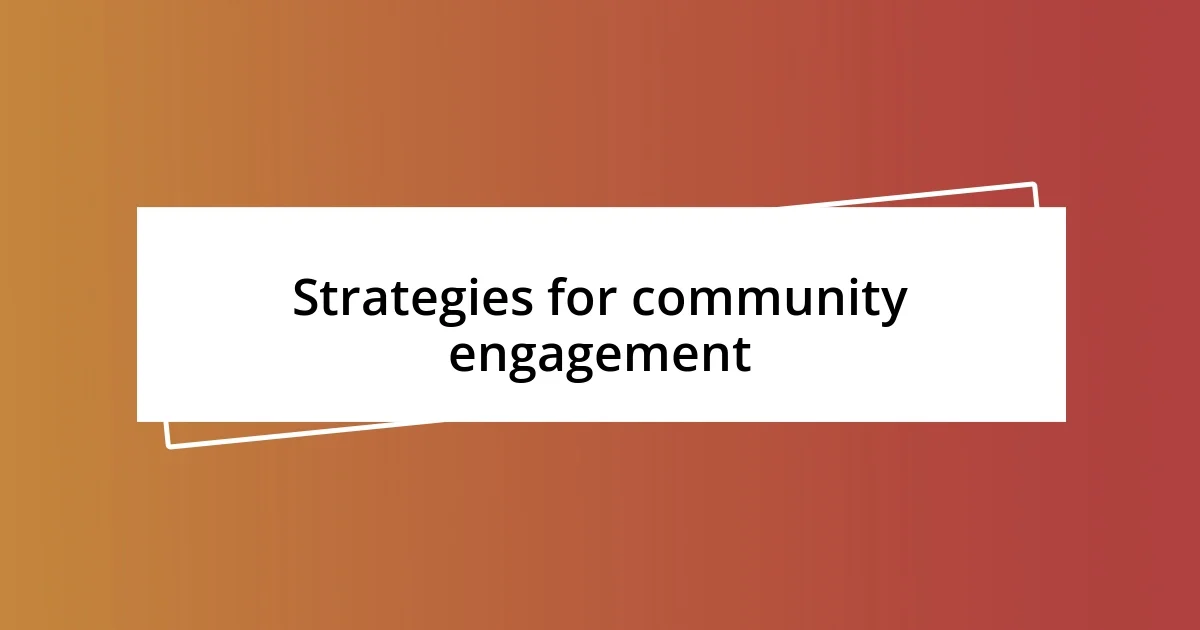
Strategies for community engagement
One effective strategy I’ve found for promoting community engagement is organizing local clean-up days. I remember the joy of seeing neighbors come together to tidy a local park; we not only beautified our environment but also sparked conversations about recycling. It was amazing how picking up litter turned into discussions on how we could better recycle our plastics and papers at home. Events like these create a sense of community while fostering a culture of responsibility.
Another approach is leveraging social media platforms to share success stories and tips. I once shared a short video of my family sorting our recyclables on social media, and the response was heartwarming. Friends began to share their own efforts, turning what could have been a mundane chore into a fun challenge. Here are some strategies that have worked well for me:
- Organize community events: Plan clean-up days or recycling drives that unite people and raise awareness.
- Create social media campaigns: Use platforms to showcase collective efforts and share practical recycling tips.
- Incentivize participation: Partner with local businesses to offer rewards or coupons for those engaging in recycling initiatives.
These strategies transform recycling from a solitary task into a shared community endeavor, making it more enjoyable and impactful.
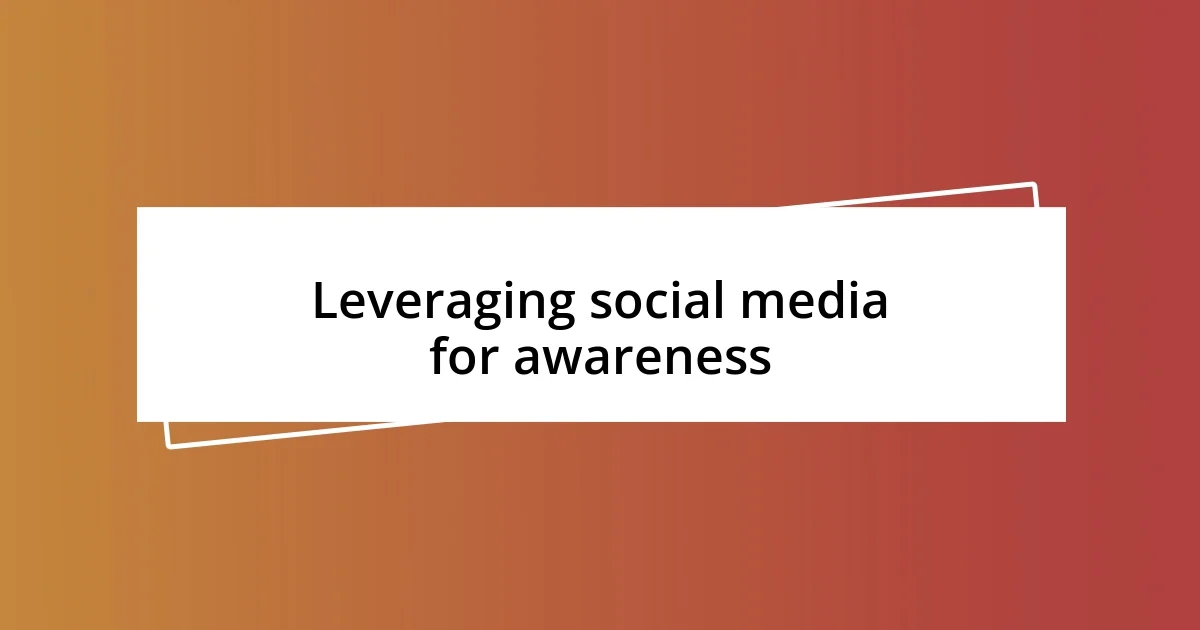
Leveraging social media for awareness
Social media has become a powerful tool in raising awareness about recycling, and I’ve seen firsthand how it can ignite passion in a community. A few months ago, I decided to start a hashtag on Instagram to encourage local recycling efforts. I titled it “#RecycleChallenge,” and to my surprise, it caught on! Friends and neighbors began posting photos of their recycling successes, and the contributions turned into a vibrant tapestry of our community’s commitment. Watching the array of creative ways people repurposed items not only inspired others but also strengthened our collective resolve to reduce waste.
I’ve also utilized Facebook groups to create a platform for sharing resources and tips on recycling. Just last week, a member posted about a local recycling event, and it motivated several of us to make plans to attend together. It felt empowering to know that social media was connecting us, making it easier to gather information and support each other’s recycling journeys. Isn’t it fascinating how a simple post can lead to real-life connections and action?
Finally, I love how platforms like TikTok can bring a fun and engaging approach to recycling awareness. I recently watched a hilarious spoof on recycling mistakes that really captured my attention. It was effective because it blended humor with education, reminding people not to throw plastic bags into the recycling bin. Engaging, creative content like this makes me reflect on how we can creatively harness social media to not only spread awareness but also invite laughter and camaraderie into the serious topic of recycling. Who wouldn’t want to be a part of that journey?
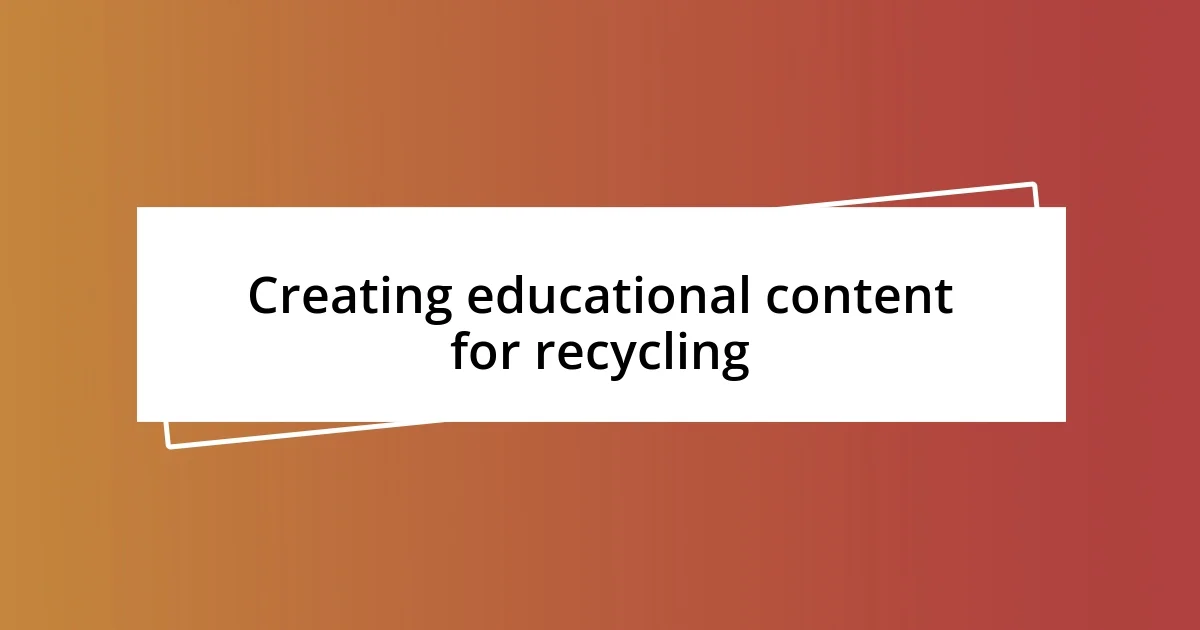
Creating educational content for recycling
Creating educational content for recycling can really make a difference in how we approach this vital practice. I remember when I designed a simple infographic illustrating what can and cannot be recycled; it was eye-opening. Friends told me they hadn’t realized that certain types of plastic, like those from takeout containers, were not recyclable in our area. It felt rewarding to know my small effort led to greater understanding among my peers.
I’ve also hosted interactive workshops where participants could bring in their recyclables and learn how to sort them correctly. Seeing the puzzled looks on their faces transform into bright smiles as they grasped the concept was incredibly fulfilling. Isn’t it amazing how hands-on experiences can create a deeper connection to recycling? It’s not just about what goes in the bin; it’s about understanding the larger impact of our choices.
Creating fun quizzes or challenges related to recycling can also be a great way to engage the community. I once created a light-hearted quiz for a local fair, asking participants to guess which items were recyclable. The laughter and friendly debates that ensued made it clear that people love learning in a playful environment. It’s moments like these that remind me that education can and should be enjoyable, inviting everyone to be a part of the solutions we all need.
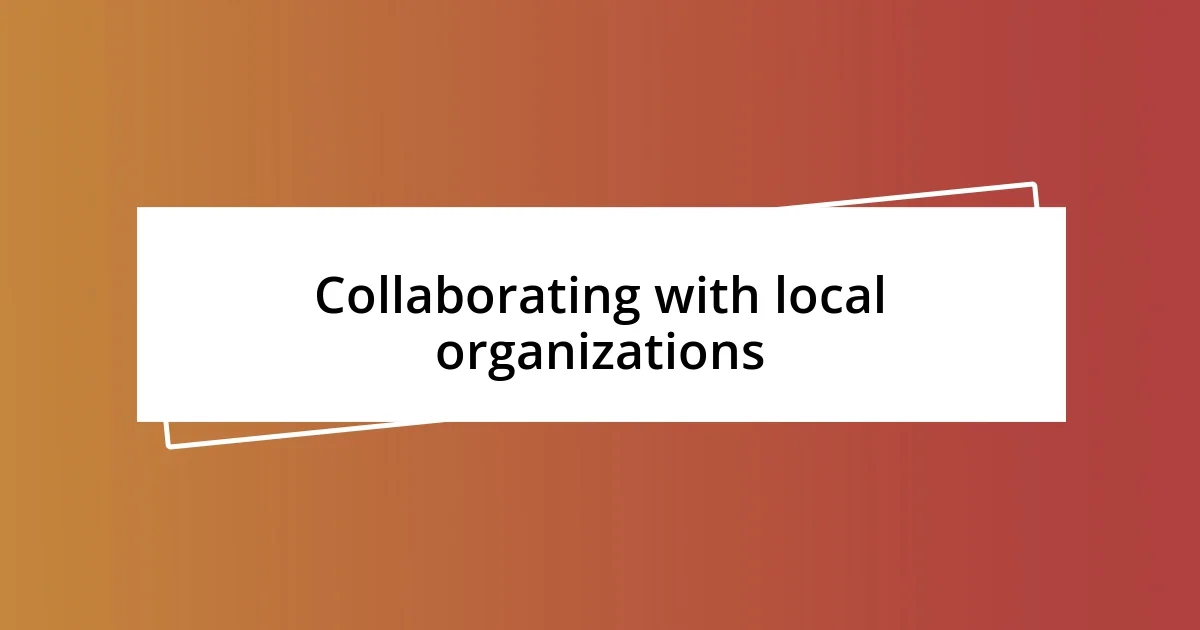
Collaborating with local organizations
Collaborating with local organizations can amplify the recycling message in ways that single-handed efforts often can’t achieve. For instance, when my local community center partnered with a nearby environmental group, we organized a recycling drive that not only collected materials but also educated attendees about proper recycling techniques. I’ll never forget the excitement in the air as volunteers eagerly sorted through items, each person playing a part in the larger mission. Isn’t it fascinating how teamwork can create a ripple effect of awareness and action in the community?
I’ve found that local businesses often want to contribute as well, and I had a delightful experience partnering with a local café. They agreed to provide discounts for customers who brought their own reusable containers. To my surprise, the café saw an increase in patrons eager to make eco-friendly choices. This collaboration showed me firsthand that when local entities come together for a common cause, it can boost participation and enthusiasm. How rewarding it feels to see businesses taking a stand!
Another remarkable collaboration I experienced was with local schools, where we initiated a “Recycling Ambassador” program. Students volunteered to mentor younger kids about the importance of recycling, and it was a joy to watch their excitement. Engaging different age groups not only educated them but also fostered a sense of community ownership around sustainability. Seeing these young ambassadors share their passion inspired me—what better way to instill lifelong habits than by empowering the next generation?

